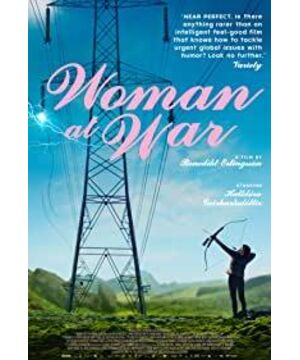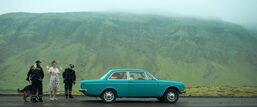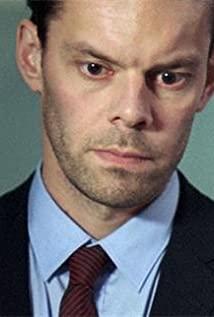"Women at War" tells the story of a woman who is committed to protecting the environment against the development of heavy industry in Iceland. Although environmental protection is a topic that attracts attention and is fashionable, the film is neither preachy nor extreme in its expression. It uses individual beliefs and struggles, as well as emotions and encounters in personal life to express the current contradictions and dilemmas. Cleverly arranged, complete the reasoning of the theme.
In terms of style, the addition of a moderate amount of cold humor makes this highly realistic story more vivid. Whether it is satire or warmth, the artistic treatment also ensures the quality of the film on the other hand.
Of course, the protagonist's expression and resistance in the film are controversial. Hanla, a mysterious person known by the media as the "Daughter of the Mountain", is usually a chorus conductor and musician. She protested against the government's efforts to develop heavy industry and destroy the natural environment by destroying power lines and forcing factories to shut down.
Po Hanla's sabotage pits her against the government that supports heavy industry. Neither side wants to compromise, and the situation escalates and forms a certain tug-of-war.
On the side of the government, on the one hand, it has increased the investment of human and material resources, and has set up a net, with police on the ground blocking roads and important places, and helicopters and drones equipped with thermal imagers in the sky. He deliberately ignored Hanra's demands and focused on Hanra's "violent behavior", even calling him a "terrorist".
And for Hanra, "I do what I truly believe is right!" With such a belief, she will never give up until she achieves her goal. Of course, Hanra didn't just want to be a lone hero, she still hoped that her actions could influence the public, not only increase the pressure on the government, but also hope that the environmental issues she cares about will be taken seriously by more people.
Hanra climbed the government building as a victor who defied sinners and threw leaflets, to little effect. Hanra has a strong physique and has rich experience in anti-reconnaissance and anti-arrest in the face of the police, but his thoughts on others may be a little too ideal. In terms of influencing the public, the government has more experience and more effective means. In addition, the particularity of this story taking place in Iceland is also reflected at this point.
Iceland, because of the geographical relationship, has not been over-exploited industrially, and its natural conditions are still very good, and there are no natural disasters or climatic abnormalities. For the public, the benefits of developing their own economy are naturally more felt than the reports of "distressed waters" elsewhere on the planet.
In the film, Hanra is vulnerable and increasingly isolated from the sympathy of her fellow citizens. However, for the audience who watched the movie, Hanla was more likely to be recognized with the help of other people, and her controversy was gradually weakened.
Hanra is an independent, strong, courageous, sincere woman who, though impulsive and willful at times, is never selfish. Also, she really loves nature. She enjoys every opportunity to be close and in touch with nature, even when she is forced to the ground.
The film outlines the characters and expresses the theme through Hanra's behavior and encounters. In addition to the most important "career", Hanla has also ushered in a "big event" in her personal affairs, that is, her application for adopting a child has taken shape. This part of the content, at first glance, has little to do with the theme of the film, but it is not idle writing. The description of personal life not only enriches the characters, Hanla will face the problem of how to choose when personal and career conflict, further provides explanation for her actions and intentions, and finally echoes the theme (this is the last one).
Waiting for adoption is a 4-year-old girl, a war orphan in Ukraine. It's been four years since she submitted her application, and she herself has forgotten about it. At one point, Hanra shifted the focus of her life from sabotage to preparing for the arrival of the little girl, but the government's smearing of her in the media made her unwilling to stop there. In the next action, Hanra accidentally injured his hand and left bloodstains, and his identity was finally revealed.
Hanra's injury is also an interesting episode. When she was destroying the power line, the chainsaw used to cut the wire ran out of power, so she had to use the saw to cut by hand, and she injured her hand. How ironic! In fact, people's lives today are inseparable from the support of industry. The development of industry is bound to destroy the environment. This is the contradiction and the predicament.
And those pylons and wires standing in the wild nature, those things that Hanra wants to destroy, those obtrusive things, are they ugly man-made "garbage" or majestic man-made "miracles"? Different viewers will have different understandings.
Hanra buried the picture of the little girl in the roadside tundra before being caught by the police. The little girl, and this beautiful land, seem to take her away...
It was her twin sister Asha who rescued Hanra.
The two sisters have very different interests. While Hanla was committed to environmental protection, Asha, the bohemian yoga teacher, chose to face her inner self and prepared to go to a retreat in India for two years. . She doesn't know what Hanra is doing, and doesn't approve of it, but when Hanra's desire to adopt a child is about to be shattered, she decides to grant Hanra. Asha took advantage of the opportunity to visit Hanla in prison, "stealing the dragon and turning the phoenix", the two exchanged identities, Asha replaced Hanla in jail, and will conduct her own practice in prison.
Apart from Asha, the nobles who helped Hanra also included a kind farmer and an innocent young man. The experience of the latter "noble man" is also a satirical section of the film that deliberately insinuates reality. This is a young backpacker of color who rides a bicycle and wears a Guevara T-shirt. When he happened to show up at the site of the destruction or near Hanra, he was caught by the police as a suspect. People often blame some social problems on foreign minorities, ignoring the root of the problem, but actually complicating the problem and losing the possibility of discussing and solving the essence of the problem.
In the end, Hanra finally came to Ukraine as she wished. Hanra not only met the little girl, but also encountered a major flood that violated people's lives (unfortunately Ukraine, man-made disasters and natural disasters). Iceland has great mountains and rivers, but the rest of the planet may be suffering from nature's revenge. At the end of the film, it returns to the theme of environmental protection and predicament. A little unexpected, the effect is deep and intense.
The last thing to say is an important part of the style of the film: "live music". The band responsible for the film's soundtrack and the vocal chorus appeared directly in the film. They appear when voice acting is needed to express the character's emotions. And they did not appear as "props", they also participated in the interaction of the film and had their own emotions. When they provide emotional soundtracks around the characters, there's a bit of a slap in the face, and it's really cold and funny.
This conflicted engagement and interaction is very interesting. As mentioned at the beginning of the article, the chic style softens the reality and seriousness of the subject, and enhances the unique style and artistry of the film.
(Personal account "Wednesday Noise" noiwed, welcome to pay attention)
View more about Woman at War reviews











